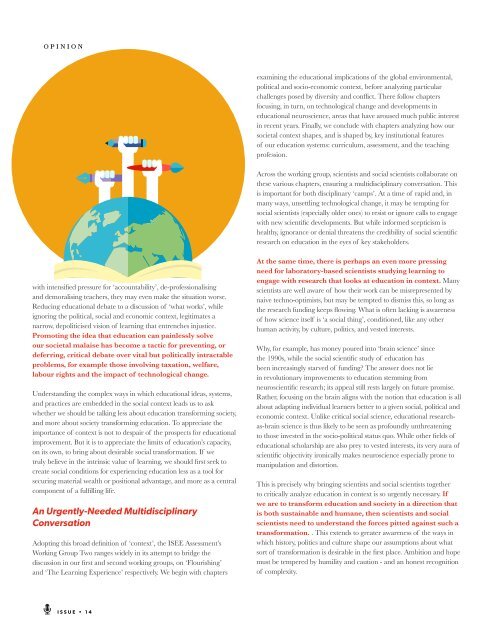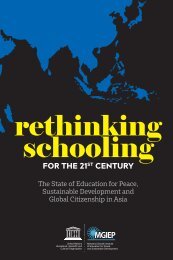The Blue DOT 14 - Multidisciplinary Science & Evidence For Education
Welcome to the 14th edition of the Institute’s flagship publication, The Blue DOT. In this edition, we bring to you news of the International Science and Evidence-based Education Assessment (ISEE Assessment) that the Institute embarked on about 18 months ago. The International Science and Evidence-based Education (ISEE) Assessment contributes to re-envisioning the future of education and feeds into UNESCO's Futures of Education report, today constituting over 250 authors from 70 countries. Read Opinion Pieces by thought-leaders, experts and academics, watch interviews with our advisory board members and explore the learnings of our research fellows while navigating experience of the Multidisciplinary Science & Evidence for Education.
Welcome to the 14th edition of the Institute’s flagship publication, The Blue DOT. In this edition, we bring to you news of the International Science and Evidence-based Education Assessment (ISEE Assessment) that the Institute embarked on about 18 months ago. The International Science and Evidence-based Education (ISEE) Assessment contributes to re-envisioning the future of education and feeds into UNESCO's Futures of Education report, today constituting over 250 authors from 70 countries. Read Opinion Pieces by thought-leaders, experts and academics, watch interviews with our advisory board members and explore the learnings of our research fellows while navigating experience of the Multidisciplinary Science & Evidence for Education.
Create successful ePaper yourself
Turn your PDF publications into a flip-book with our unique Google optimized e-Paper software.
OPINION<br />
examining the educational implications of the global environmental,<br />
political and socio-economic context, before analyzing particular<br />
challenges posed by diversity and conflict. <strong>The</strong>re follow chapters<br />
focusing, in turn, on technological change and developments in<br />
educational neuroscience, areas that have aroused much public interest<br />
in recent years. Finally, we conclude with chapters analyzing how our<br />
societal context shapes, and is shaped by, key institutional features<br />
of our education systems: curriculum, assessment, and the teaching<br />
profession.<br />
Across the working group, scientists and social scientists collaborate on<br />
these various chapters, ensuring a multidisciplinary conversation. This<br />
is important for both disciplinary ‘camps’. At a time of rapid and, in<br />
many ways, unsettling technological change, it may be tempting for<br />
social scientists (especially older ones) to resist or ignore calls to engage<br />
with new scientific developments. But while informed scepticism is<br />
healthy, ignorance or denial threatens the credibility of social scientific<br />
research on education in the eyes of key stakeholders.<br />
<strong>The</strong> learning experience:<br />
Insights and gaps in current<br />
research<br />
ADRIANO LINZARINI, REBECCA MERKLEY, MOHSEN SAADATMAND<br />
with intensified pressure for ‘accountability’, de-professionalising<br />
and demoralising teachers, they may even make the situation worse.<br />
Reducing educational debate to a discussion of ‘what works’, while<br />
ignoring the political, social and economic context, legitimates a<br />
narrow, depoliticised vision of learning that entrenches injustice.<br />
Promoting the idea that education can painlessly solve<br />
our societal malaise has become a tactic for preventing, or<br />
deferring, critical debate over vital but politically intractable<br />
problems, for example those involving taxation, welfare,<br />
labour rights and the impact of technological change.<br />
Understanding the complex ways in which educational ideas, systems,<br />
and practices are embedded in the social context leads us to ask<br />
whether we should be talking less about education transforming society,<br />
and more about society transforming education. To appreciate the<br />
importance of context is not to despair of the prospects for educational<br />
improvement. But it is to appreciate the limits of education’s capacity,<br />
on its own, to bring about desirable social transformation. If we<br />
truly believe in the intrinsic value of learning, we should first seek to<br />
create social conditions for experiencing education less as a tool for<br />
securing material wealth or positional advantage, and more as a central<br />
component of a fulfilling life.<br />
An Urgently-Needed <strong>Multidisciplinary</strong><br />
Conversation<br />
Adopting this broad definition of ‘context’, the ISEE Assessment’s<br />
Working Group Two ranges widely in its attempt to bridge the<br />
discussion in our first and second working groups, on ‘Flourishing’<br />
and ‘<strong>The</strong> Learning Experience’ respectively. We begin with chapters<br />
At the same time, there is perhaps an even more pressing<br />
need for laboratory-based scientists studying learning to<br />
engage with research that looks at education in context. Many<br />
scientists are well aware of how their work can be misrepresented by<br />
naive techno-optimists, but may be tempted to dismiss this, so long as<br />
the research funding keeps flowing. What is often lacking is awareness<br />
of how science itself is ‘a social thing’, conditioned, like any other<br />
human activity, by culture, politics, and vested interests.<br />
Why, for example, has money poured into ‘brain science’ since<br />
the 1990s, while the social scientific study of education has<br />
been increasingly starved of funding? <strong>The</strong> answer does not lie<br />
in revolutionary improvements to education stemming from<br />
neuroscientific research; its appeal still rests largely on future promise.<br />
Rather, focusing on the brain aligns with the notion that education is all<br />
about adapting individual learners better to a given social, political and<br />
economic context. Unlike critical social science, educational researchas-brain<br />
science is thus likely to be seen as profoundly unthreatening<br />
to those invested in the socio-political status quo. While other fields of<br />
educational scholarship are also prey to vested interests, its very aura of<br />
scientific objectivity ironically makes neuroscience especially prone to<br />
manipulation and distortion.<br />
This is precisely why bringing scientists and social scientists together<br />
to critically analyze education in context is so urgently necessary. If<br />
we are to transform education and society in a direction that<br />
is both sustainable and humane, then scientists and social<br />
scientists need to understand the forces pitted against such a<br />
transformation. . This extends to greater awareness of the ways in<br />
which history, politics and culture shape our assumptions about what<br />
sort of transformation is desirable in the first place. Ambition and hope<br />
must be tempered by humility and caution - and an honest recognition<br />
of complexity.<br />
After a bachelor’s degree in<br />
biology and a master’s degree in<br />
neuropsychology and cognitive<br />
psychology, Adriano completed<br />
a PhD in cognitive neuroscience.<br />
His thesis mainly focused on the<br />
development from childhood to<br />
adulthood of executive functioning,<br />
a series of cognitive skills that are<br />
strongly associated with quality of life,<br />
academic achievement and mental<br />
health. Among others, he worked as a<br />
scientific consultant for the UNICEF’s<br />
project « Measuring What Matters »<br />
(Office of Research Innocenti), and as<br />
a neuroscience workshop instructor in<br />
the private sector.<br />
Rebecca Merkley is an Assistant<br />
Professor in Cognitive <strong>Science</strong><br />
at Carleton University in Ottawa,<br />
Canada. She has a PhD in Experimental<br />
Psychology from the University<br />
of Oxford and an EdM in Mind,<br />
Brain, and <strong>Education</strong> from Harvard<br />
University. Her recent research<br />
projects have included researchpractice<br />
partnerships investigating<br />
whether educators benefit from<br />
learning about findings from the<br />
science of learning and implementing<br />
them in their classrooms.<br />
With a background in educational<br />
technology, Mohsen’s research<br />
focuses on technology-enhanced<br />
learning and online education. After<br />
completing his PhD dissertation on<br />
MOOCs at the University of Helsinki,<br />
Finland he continued working on<br />
digital educational games for STEAM<br />
<strong>Education</strong> as part of his postdoctoral<br />
research. Mohsen’s research<br />
integrates a variety of learning<br />
technologies with different methods<br />
in designing, implementing, and<br />
evaluating online/blended learning<br />
solutions<br />
ISSUE • <strong>14</strong><br />
3 1

















